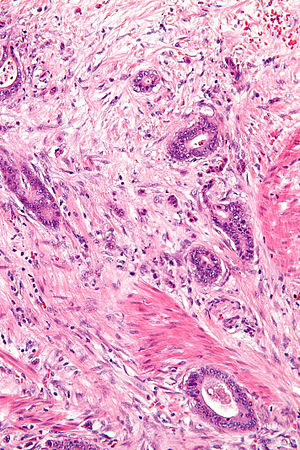Tumour budding
Tumour budding refers to lone tumour cells or small clusters of tumour cells at the advancing front of a tumour.[1]
General
- Poor prognosticator in colorectal carcinoma,[2] and invasive ductal carcinoma of the breast.[3]
Microscopic
Definition - rectal carcinoma:[4]
- Tumour bud = 1-4 cell(s) -- at the tumour front.
Grading:
- Low grade: 0-4 tumour buds.
- Intermediate grade: 5-9 tumour buds.
- High grade: >=10 tumour buds.
Note:
- Assessed in a field area of 0.785 mm2.[4]
- Tumour budding was previously assessed in a field of 0.385 mm2.[1]
DDx:
- Poorly differentiated adenocarcinoma.
Images
Tumour budding in CRC - intermed. mag. (WC)
See also
References
- ↑ 1.0 1.1 Ueno, H.; Murphy, J.; Jass, JR.; Mochizuki, H.; Talbot, IC. (Feb 2002). "Tumour 'budding' as an index to estimate the potential of aggressiveness in rectal cancer.". Histopathology 40 (2): 127-32. PMID 11952856.
- ↑ Mitrovic, B.; Schaeffer, DF.; Riddell, RH.; Kirsch, R. (Oct 2012). "Tumor budding in colorectal carcinoma: time to take notice.". Mod Pathol 25 (10): 1315-25. doi:10.1038/modpathol.2012.94. PMID 22790014.
- ↑ Gujam, FJ.; McMillan, DC.; Mohammed, ZM.; Edwards, J.; Going, JJ. (Sep 2015). "The relationship between tumour budding, the tumour microenvironment and survival in patients with invasive ductal breast cancer.". Br J Cancer 113 (7): 1066-74. doi:10.1038/bjc.2015.287. PMID 26263482.
- ↑ 4.0 4.1 Lugli, A.; Kirsch, R.; Ajioka, Y.; Bosman, F.; Cathomas, G.; Dawson, H.; El Zimaity, H.; Fléjou, JF. et al. (Sep 2017). "Recommendations for reporting tumor budding in colorectal cancer based on the International Tumor Budding Consensus Conference (ITBCC) 2016.". Mod Pathol 30 (9): 1299-1311. doi:10.1038/modpathol.2017.46. PMID 28548122.
